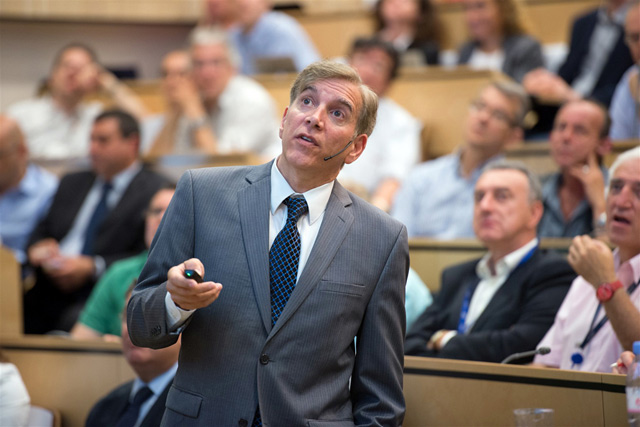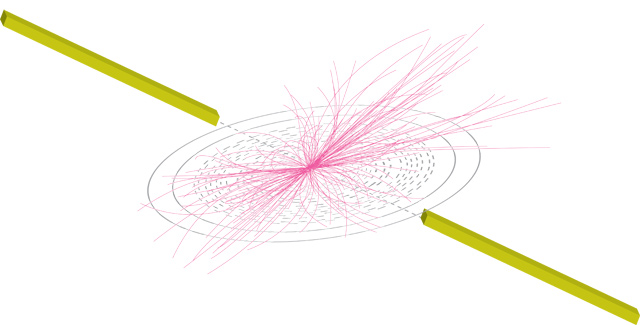How to Higgs Boson
Q&A with UCSB Professor Joe Incandela

On July 4, UCSB professor Joe Incandela made the historic announcement to a worldwide audience that a new particle resembling the Higgs boson had been discovered. He earned that privilege when elected in April 2011 to a two-year term as spokesperson for the CMS (Compact Muon Solenoid) experiment, which is a collaboration between roughly 3,000 scientists from 179 institutions in 41 countries. Altogether, it’s a de facto government, so calling Incandela merely a “spokesperson” is a bit misleading — “president,” “executive director,” or “generalissimo” might all be more appropriate. On top of that, he’s the first American in charge of any LHC experiment.
To hear Incandela put it, his leadership position stems from seniority, and he moved up the ranks naturally. But according to UCSB Dean of Sciences Pierre Wiltzius, “Behind this modest person, there’s a very strong, smart, and incredible leader.” In addition to the public speaking, Incandela’s job involves herding 3,000 highly intelligent cats, which isn’t so easy, said Wiltzius, explaining, “You can’t always just say, ‘Let’s figure this out together.’” Beyond that, Incandela has some serious science chops, too. “In these collaborations,” said UCSB’s Vice Chancellor Michael Witherell, whom Incandela replaced on the Physics faculty in 1998, “it needs to start with your own credibility as a scientist.”
The Higgs boson announcement coincided with the beginning of the International Conference on High Energy Physics in Melbourne, which is where Incandela was when he graciously answered a few of The Santa Barbara Independent’s questions via email earlier this month.
When you were selected as spokesperson, did you have any idea you’d be making this announcement? Actually, I was not expecting we would have enough data to discover the Higgs boson in my term [which began on January 1] when I was elected. Shortly afterward, however, I realized we really had a viable hunt underway because the LHC was functioning better than expected!
How was it decided that CMS would announce its findings before ATLAS, the other experiment at CERN that found the same particle? The first big seminar/announcement on the Higgs search was December 13, 2011. ATLAS presented first that time, so I was given the option to go first this time for CMS. In an open meeting for the whole collaboration, I asked whether there was a preference, and most people thought it would be good to go first. Keep in mind that the two experiments are really on a par in every sense, so it is best to rotate like this.
Can you describe the process of crafting the announcement? There are a couple of levels of announcements that were involved. First of all, the most important from my perspective was the 45-minute presentation that I gave to the scientific community. This involved, first of all, that five important and different search channels had been completed, thoroughly documented, thoroughly scrutinized, and approved by the collaboration.

The documentation of these analyses, including all supporting analysis notes, probably exceeds 1,000 pages of fairly dense material. This was completed last week for almost all of the results presented. A few small additions were approved the two days before the seminar. All of these results had to be condensed into a short 45-minute presentation. This was extremely difficult.
The question is how to get across not only the final results, but also the major innovations, cross-checks, and key details. Well, it is impossible to do it all, so I focused on the key ingredients in a general way, showing the most informative summary plots of the key components, to give people confidence that we knew what we were doing. This work involved perhaps 40 people assisting me for about four days.
Another part of the announcement process is writing statements for the public and the press. This took place in parallel with the preparation of the presentation and involved dozens of people from many countries. There are 40 countries participating in the experiment, and so when the press statement was finalized in English, we had volunteers translate it into something like 25 different languages. I did not have much involvement in the writing of this statement, but it required my approval at the end.
The final piece of the announcement is the writing of the press statement from the CERN laboratory itself, summarizing the results for both experiments. I worked with the lab Director General Rolf-Dieter Heuer and Fabiola Gianotti, who is my counterpart on the ATLAS experiment, as well as several other directors at CERN and the CERN press office.
What does it feel like to be part of such a major discovery? It is amazing! This is the most amazing experience of my life. From a scientific standpoint, this particular discovery is very important and profound. Over the past century or so, particle physicists have discovered three generations of what we call “matter particles” that are the building blocks of ordinary matter and massive copies of the building blocks of matter. We have also discovered the nature of all the particles that carry the forces between the matter particles.
A Higgs boson is different from any of these particles. It is really a particle that is associated directly with the structure of the universe itself. I like to give the analogy that it is part of the “genetic code” of the universe. In this sense, the discovery of a Higgs boson is very profound and represents our deepest probing ever into the fabric of space-time. I feel extremely privileged to be part of it.
Of course, it is also really great that it has been recognized worldwide as a major step forward for physics. I had to take a series of flights the evening of the announcement in order to get to a major conference in Melbourne. We had a layover in Singapore, and I saw that the discovery was on the front page of the top Asian newspapers. In fact, everywhere I go, people want to know about it. I think this is a great thing for science.



